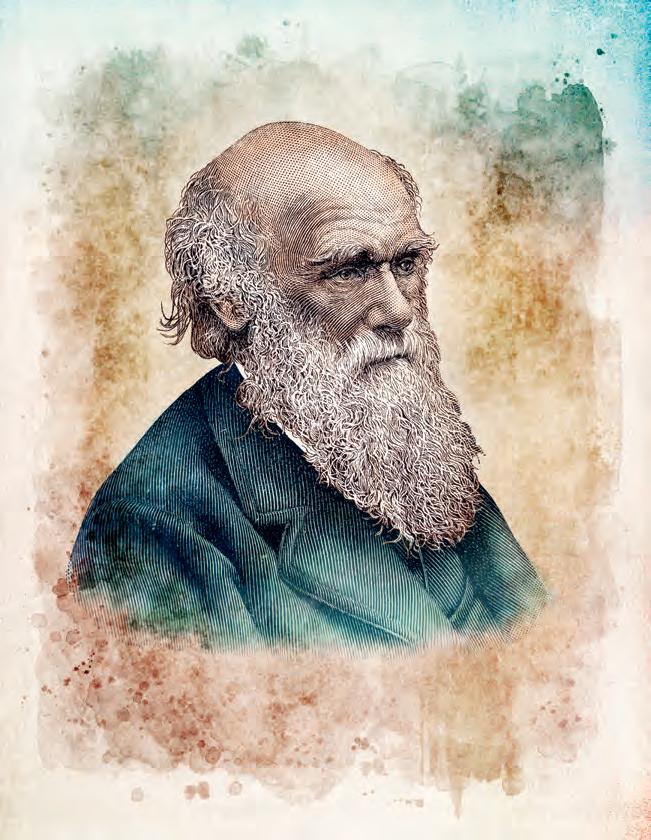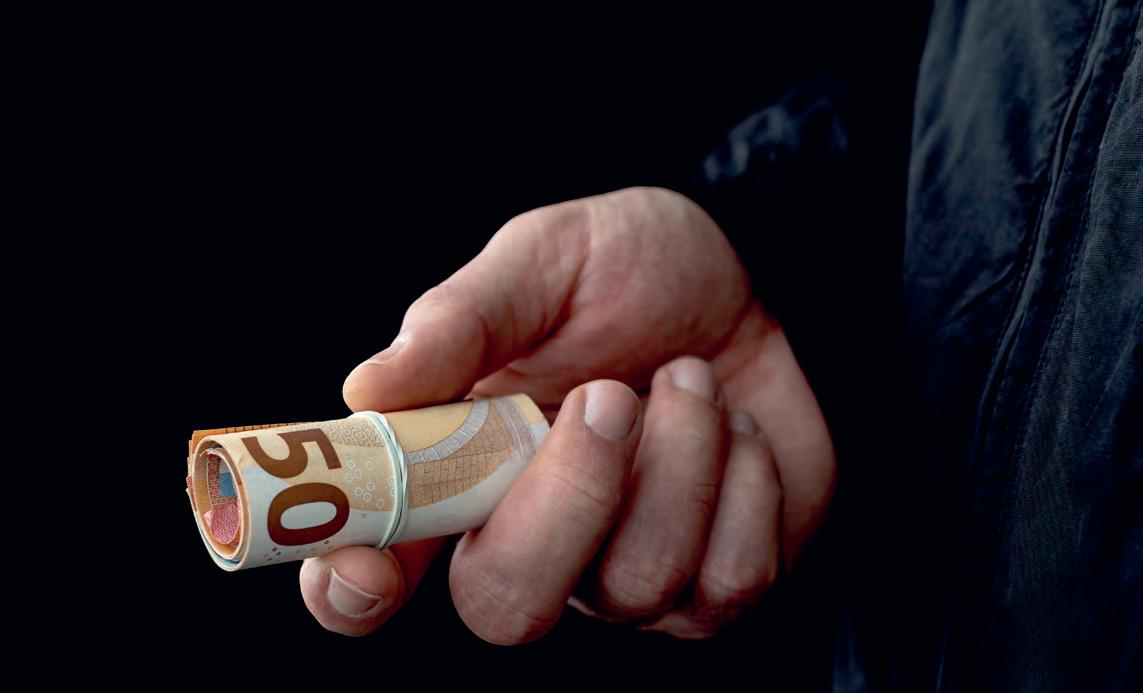



















































































































































































































Engelsk for ungdomstrinnet
Synnøve Pettersen
Felicia Røkaas
BOKMÅL





















































































































































































































Engelsk for ungdomstrinnet
Synnøve Pettersen
Felicia Røkaas
BOKMÅL
This book will take you to the next and final stage on your journey to improve your English language skills at middle school. It will take you to places near and far in the past, present and future. It will even take you to magical faraway places where strange things can happen. On this journey you will be entertained by stories about ordinary and extraordinary people, and fantasy creatures. You will also learn interesting things about the English-speaking world, and meet some of the people who live there. Along the way you will learn and practice your skills in English by listening, reading, speaking and writing. The more you listen, read, speak and write, the better you will be. English opens up new worlds. Explore and be inspired by the people, places and stories in this book. We hope you will work hard and have fun too.
Stages 10 has five chapters. At the beginning of each chapter, you will find the Chapter Focus. These bullet points tell you what the chapter will cover.
Each chapter contains 10–13 texts. Each text has a glossary. The words in the glossary are there to help you read the text. You don’t have learn all the words in the glossary lists. Sometimes you will come across a word you don’t know which is not in the glossary. Don’t panic. You can still understand and enjoy a text even if you don’t know all the words.
You will find these different kinds of tasks in Stages 10:
Starting Point: These tasks and activities help prepare you for the text.
Understanding: These tasks check your understanding of the text. Your teacher will decide how you will do these tasks: orally or in writing.
Viewpoints: These discussion questions often ask you to give your opinion.
Language Lab: These tasks focus on grammar and language.
Vocabulary: These tasks help you learn new words and expressions.
Speaking Spot: These tasks get you talking and help you improve your pronunciation.
Listening Skills: These tasks ask you to listen for information.
Writing Workshop: These tasks help you improve your writing skills.
Creative Corner: These activities ask you to be creative.
Digital Dive: These tasks send you to the internet to learn more about a topic from the text.
Text Analysis: These tasks help you use specific terms for talking and writing about literature.
Explore More: These tasks suggest ways you can explore something further.
At the end of each chapter, you will find:
SPEAK & WRITE
These tasks are connected to the topic of the chapter. They can be used for tests or for practice.
LANGUAGE WORK
This grammar course will help you improve your language skills. Each course presents certain grammar rules with examples. There are also exercises to help you practice the rules.
These writing courses will help you develop the skills you need to improve your writing. Each course gives you explanations, tips, examples and exercises.
Next to some of the tasks in Stages you will see these symbols: Your teacher will give you a handout.
This task makes you get up from your chair and move around.
This page number tells you where you can find help to complete the task. 000
1 CHOICES 8
Lifehack: How to Make Choices 10 factual text CHAPTER FOCUS
Darwin’s List 15 factual text
Eleanor & Park 18
Rainbow Rowell novel extract
The Offer 23
Sophie McKenzie novel extract
The Giver 29
Lois Lowry novel extract
Does My Head Look Big in This? 32
Randa Abdel-Fattah novel extract
A Boy’s Best Friend 38
Isaac Asimov short story
Ovatniah 45
Roland Smith short story
Build a Life 54
Ashton Kutcher speech
Speak & Write 57 tasks
Language Work 58 grammar
Improve Your Writing Part 1 62 course and tasks
• reading, writing and speaking about choices
• using the future tense
• using writing strategies
The Value of Democracy 73 factual text CHAPTER FOCUS
The Universal Declaration of Human Rights 77 factual text
Malala – A Human Rights Activist 82 factual text
I Have a Dream 88 factual text
Black Lives Matter 92 factual text
The Hate U Give 98
Angie Thomas novel extract
The British 104 Benjamin Zephaniah poem
Two Caravans 108
Marina Lewycka novel extract
Home 114
Warsan Shire poem
Speak & Write 118 tasks
Language Work 119 grammar
Improve Your Writing Part 2 121 course and tasks
3 INDIGENOUS PEOPLES 126
• reading, writing and speaking about democracy and citizenship
• using relative pronouns
• evaluating sources
• using quotes and references
Two Wolves 128 legend CHAPTER FOCUS
Indigenous Peoples 130 factual text
Indigenous Australians 136 factual text
Aboriginal Art 140 guided tour
The Stolen Generations 142 factual text
Maori 147 factual text
Whale Rider 150 film review
The Haka 153 factual text
Native Americans 156 factual text
The Boy who Lived with the Bears 163
Joseph Bruchac legend
Navajo Code Talkers 165 factual text
The Absolutely True Diary ... 170
Sherman Alexie novel extract
First Nation 178
Robert Hirst and Tasman Keith song lyrics
Speak & Write 182 tasks
Language Work 183 grammar
Improve Your Writing Part 3 187 course and tasks
• reading, writing and speaking about the history, culture and languages of Indigenous peoples
• using active and passive voice
• improving your writing
Exploring the English-speaking World 194factual text
Nigeria – The Giant of Africa 196
Nollywood 200
factual text
factual text
The Blind Man and the Hunter 204 Retold by Hugh Lupton legend
Survivors 208 Beverley Naidoo
South Africa 216
Apartheid 222
Robben Island – The Dark Years 227
Nelson Mandela
Born a Crime 235
Trevor Noah
Australia – The Land Down Under 243
The Great Barrier Reef 249
Beyond the Cape of Storms 252
Iain Lawrence
novel extract
factual text
factual text
autobiography extract
memoir extract
factual text
factual text
novel extract
Speak & Write 258 tasks
Language Work 260 grammar
Improve Your Writing Part 4 266
course and tasks


• reading, writing and speaking about the English-speaking world and English as a global language
• learning to avoid common mistakes
• preparing for the English exam

268
Sustainable Development 270 factual text CHAPTER FOCUS
Nature Is What We See 271
Emily Dickinson poem
Love Song to the Earth 274 song lyrics
Climate Change 278 factual text
Teenagers Taking Action 284 monologues
Svalbard 291
Felicia Røkaas factual text
Life-giving Water 300 short story
Connor’s Conscience 304 instagram posts
What the World Eats 310
Peter Menzel and Faith D’Alusio photographs
Meatless Monday 313 dialogue
Speak & Write 317 tasks
Language Work 318 grammar
Improve Your Writing Part 5 322 course and tasks


• reading, writing and speaking about sustainable development
• using the genitive
• reviewing different types of texts



• reading, writing and speaking about making choices
• using the future tense
• using writing strategies

You are going to participate in a speed dating event with your class. Divide the class in two and make two lines facing each other. You will have two minutes to talk to the partner in front of you about a topic, before moving down the line to a new partner. Your teacher will give you the discussion topics.
participate delta event begivenhet
insignificant ubetydelig decision avgjørelse overwhelming overveldende face stå overfor
Life is filled with choices. Some are small, insignificant, everyday decisions, like what to have for lunch or what sweater to wear. Other choices are bigger and more lifedefining, like what study program or education to choose. Sometimes these decisions can feel overwhelming. Here are six strategies that may help when you face a difficult choice:
If you ask five people for advice, you may end up with five different answers and become even more confused than before. However, consult one or two people who you trust, and who will base their advice on what they believe is best for you.
Your intuition is a powerful tool when you have to make a choice. Sit down in a quiet place and notice how you feel about the different options you have. Notice the emotions that each choice and possible outcome trigger in you. Do you feel relief? Excitement? Or do you react physically with stronger heartbeats, tightness in the chest area or a stomachache? These feelings might be trying to tell you something.
Write lists of the good and bad sides of each of the options you have. If one list is longer than the other, this may give you the answer you are looking for. It may also be a good idea to divide the lists into short-term and long-term consequences. Sometimes the option that feels most tempting in the short run, may not be the best option in the long run.
advice råd confused forvirret gut her: magefølelse options valg, alternativer outcome resultat trigger bringer fram relief lettelse excitement spenning tightness in the chest area at det snører seg sammen i brystet stomachache mageknip

distinguish skille fra hverandre expectations forventninger peer pressure gruppepress circumstances omstendigheter necessarily nødvendig–vis
Sometimes it is hard to distinguish your own feelings and dreams from the expectations of others. How can you make sure that your decision-making is based on your own motivation and not your parents’ expectations or peer pressure? Write a list of the things that are important to you, and make sure you focus on these things and ignore social pressure. You can use the 10–10–10 strategy: How do you think you will feel about your choice 10 minutes, 10 months and 10 years from now?
Making up one’s mind always involves a certain risk. The choice you make could turn out to be bad. Another alternative might turn out to be a better choice at some point in the future. You are responsible for the choices you make, but sometimes there will be factors that you cannot control, no matter how much thought you put into a decision.
#6
Sometimes you will have second thoughts about the decisions you have made, and that is ok. Evaluate your choice and its consequences as time passes. Have circumstances changed? Have you gotten new information or knowledge that makes you view things differently? Sometimes the best thing you can do is to change your mind. This is not necessarily because you have made a mistake, but because you have grown wiser and gotten to know yourself better as you grow up. Be open to other options and don’t be ashamed to change your mind.

1 Answer the questions.
a What is important to think about if you decide to ask people for advice?
b What are some physical reactions that could tell you that a choice is not right for you?
c How can you avoid that your decision-making is influenced by peer pressure?
d Why is it important to be flexible, according to the text?
2 Discuss the questions.
a Which of the six pieces of advice presented in the text have you used yourself?
b Which do you think is the best one? Why?
c Books and films are often about people who face challenging choices. Can you think of stories where one of the main characters has to make an important choice?
d Read the quotes about choices below. Which one do you like best? Why?
May your choices reflect your hopes, not your fears.
Nelson Mandela
You cannot control the behavior of others, but you can always choose how you respond to it.
Roy T. Bennett, The Light in the Heart
Sometimes you have to choose between a bunch of wrong choices and no right ones. You just have to choose which wrong choice feels the least wrong.
Colleen Hoover, Hopeless
VOCABULARY
3 Synonyms
a Find two synonyms for “choice” in the text.
b Use an online thesaurus and find 3–4 other synonyms for “choice”.
4 Walk and talk
Choose three questions from the list below that you would like to ask your learning partner. Copy them on a piece of paper and ask your partner while you take a walk.
• Tell me about a good decision you made.
• Tell me about a bad decision you made.
• Have you ever made a decision and then changed your mind afterwards? Explain what happened.
• If you have to make an important decision, who would you ask for advice, and why would you choose this person?
• What is the most important decision you have made so far in your life?
• What are some difficult decisions that you expect you will have to make in the next 10–15 years?
5 Sometimes it is hard to start a writing process. Freewriting is an exercise that might help you. When you have the topic or task, set a time limit. (2–4 minutes is often suitable). During that time limit, write as quickly as you can without stopping. Write anything that comes to mind. If you get stuck, just write a key word or phrase over and over until you think of something new. Do not worry about grammar, spelling or punctuation.
Imagine that you are going to write about this task: People today have too many choices. Do you agree or disagree?
a Do a freewriting exercise on this task.
b Share your ideas in small groups.
The Voice
There is a voice inside of you that whispers all day long, ’I feel that this is right for me, I know that this is wrong.’
No teacher, preacher, parent, friend or wise man can decide what’s right for you – just listen to the voice that speaks inside.
Shel Silverstein

Charles Darwin (1809–1882) was an English scientist. He is famous for the theory that evolution happens through natural selection. This means that the living creatures with the best traits for survival in an environment are most likely to survive and pass on the same helpful traits to the next generation in their species. Over time, the species evolves, as only the most adaptable creatures survive, while the traits that make survival more difficult will gradually disappear. Today, science knows about genes and DNA. Darwin’s theory has been
Two of the words below are verbs and two are nouns. Decide which words belong in each category, and use each word in a sentence. decide decision choice choose
Charles Darwin (1809–1882)
scientist vitenskapsmann evolution evolusjon natural selection naturlig utvelgelse traits trekk survival overlevelse species art evolve utvikle seg adaptable tilpasningsdyktige
breakthrough gjennombrudd constant her: trofast gender roles kjønnsroller companion partner, livsledsager chit-chat småprat, skravling intolerable utålelig, uutholdelig neuter bee arbeidsbie relatives slektninger expenses kostnader anxiety engstelse
developed and modified, but it is still considered an important breakthrough in the science of biology.
At the age of 29, Charles Darwin faced a difficult decision in his personal life: whether or not to propose to his girlfriend Emma Wedgwood. To decide, he made a list of the arguments for and against marriage. When reading the list, keep in mind that it was written in 1838, when gender roles were very different from what they are today!
MARRY
• Constant companion
• Friend in old age
• Someone to take care of the house
• Charms of music and female chit-chat
• Children
• It is intolerable to spend one’s whole life working like a neuter bee
• Picture yourself a nice soft wife on a sofa with good fire, books and music
• Good for one’s health
NOT MARRY
• No quarrelling
• Freedom to go where one likes
• Not forced to visit relatives
• More money for books
• Time to read books in the evening
• Conversation of clever men at clubs
• No expenses and anxiety of children
• Perhaps my wife won’t like London
• Terrible loss of time
1 Answer the questions.
a What is Darwin famous for?
b What dilemma did he face when he was 29 years old?
c What did he do to help him make up his mind?
2 Discuss the questions.
a Which argument do you think is the best one?
b What would you do if you were Darwin?
c What do you think he did?
d Have you ever made a list like this when you had to make a difficult decision?
e Do you think Emma Wedgwood would marry Darwin if she saw his list?
f Would you marry someone who expected you to take care of the house?
e Do you think that any of Darwin’s arguments belong in the 19th century and are irrelevant or disrespectful today? Which ones?
3 Write a list of pros and cons about one of the dilemmas below.
• Should I get a dog?
• Should I quit my spare time activity when I start at a new school in August?
• Should I join a gym?
4 Present your dilemma and your list of pros and cons from task 3 in groups. Tell your group what your conclusion is, based on all your arguments.
Find the scene from High School Musical called “A Night to Remember” on YouTube. Watch the video and then write a brief description of a high school prom.
Rainbow Rowell (1973–) is an American writer of novels for young adults.

Eleanor & Park is a novel about two young people who find it hard to fit in. They meet on the school bus and connect through comic books, music tapes and late night conversations. Slowly they fall in love. In the extract below, Park wants Eleanor to go to prom with him.
“We should go to prom,” he said.
“What?” She lifted up her head.
“Prom. You know, prom.”
“I know what it is, but why would we go there?”
Because he wanted to see Eleanor in a pretty dress. Because he wanted to help his mom do her hair.
“Because it’s prom,” he said.
“And it’s lame,” she said.
“How do you know?”
“Because the theme is ‘I Want to Know What Love Is’.”
“That’s not such a bad song,” he said.
“Are you drunk, it’s Foreigner.”
Park shrugged and pulled one of her curls straight. “I know that prom is lame,” he said. “But it’s not something you can go back and do. You only get one chance.”
“Actually, you get three chances …”
“Okay, will you go to prom with me next year?”
She started laughing. “Yes”, she said, “sure. We can go next year. That will give my mouse and bird friends plenty of time to make me a dress. Totally. Yes. Let’s go to prom.”
“You think it’s never going to happen,” he said. “You’ll see. I’m not going anywhere.”
“Not until you learn how to drive a stick.”
She was relentless.
Prom. Right. That was going to happen.
The amount of chicanery it would take to slip prom past her mother … it boggled the mind.
Though now that Park had suggested it, Eleanor could almost see it working. She could tell her mom that she was going to prom with Tina. (Good old Tina.) And she could get ready at Park’s house, his mom would love that. The only thing Eleanor would have to figure out was the dress …
Did they even make prom dresses in her size? She’d have to shop in the mother-of-the-bride section. And she’d have to rob a bank. Seriously. Even if a hundred-dollar bill fell right out of the sky, Eleanor could never spend it on something as stupid as a prom dress.
She’d spend it on new Vans. Or a decent bra. Or a boom box … Actually, she’d probably just give it to her mom.
Prom. As if.
do her hair ordne håret hennes lame teit Foreigner band fra 1980-tallet shrugged trakk på skuldrene drive a stick kjøre bil med manuelt gir relentless ubøyelig chicanery knep, krumspring boggled the mind det ble overveldende decent anstendig, ordentlig bra behå boom box bærbar stereo as if slang: særlig, skjer ikke
“My mouse and bird friends” is a reference to the fairy tale “Cinderella”, where the animals and birds make Cinderella a dress so she can go to the ball at the palace.
1 Answer the questions.
a What does Park suggest they should do?
b Why does Park want to go?
c How does Eleanor respond to Park’s suggestion?
d What is the theme of this year’s prom?
e How many times can they go to prom?
f What is the problem with the dress?
2 Discuss the questions.
a Why do you think Eleanor and Park say that prom is lame?
b Do you think there are other reasons why Eleanor doesn’t want to go to prom? What are they?
c Do you think they will ever go to prom? Why or why not?
3 Each year of American high school has a name. Use the internet and finish the table.
9th grade – freshman year
10th grade – ___
11th grade – ___
12th grade – ___
4 Translation
Some words look the same in English and Norwegian, but mean something completely different. First translate the list of words from Norwegian to English. Then translate the list from English to Norwegian.
From Norwegian to English
a bra good
b fart
c gang
d vet
e gal
f store
g fort
h fast
i hell j gave k hit l her m god n sent o gift p fire
From English to Norwegian
a bra behå
b fart
c gang
d vet e gal
f store
g fort
h fast
i hell j gave k hit
l her m god
n sent o gift p fire
5 Concord
Write the verbs in brackets in the simple present tense.
a Eleanor and Park fall (fall) in love.
b Park ___ (want) to go to prom.
c Eleanor ___ (be) unsure about the idea.
d She ___ (think) about how much the dress will cost.
e The difficulty of finding a dress her size ___ (be) another problem.
f Park and Eleanor ___ (talk) about prom.
g They ___ (have) different opinions about it.
h Eleanor ___ (wonder) what her mum will think.
i They ___ (think) prom is lame.
In America, a prom is a formal dance which marks the end of the school year in high school. Students may go to prom with a date or a group of friends. To prepare for prom the students dress up in fancy dresses and tuxedos. They pin flowers to their clothes. Some students and their parents spend a lot of money on prom and everything that goes with it: clothes, flowers, photographs, limousines and parties.
tuxedos smoking

6 Future tense.
If Eleanor and Park decide to go to the prom, Eleanor’s timeline on the day of the prom would look like this. Write five sentences about what she is planning to do on the day of the prom.
4:30 pm 5:00 pm 5:30 pm 6:00 pm 6:30 pm 7:00 pm 7:30 pm
7 Design and draw your own prom dress or tuxedo. Add text that explains details about the outfit.
8 Make Eleanor’s list of pros and cons about going to prom, or make Park’s list.
9 Replace “said” in three lines of dialogue from the text with an alternative. Example: “We should go to prom,” he said suggested.
10 Imagine that Eleanor is your friend. Write a dialogue where you discuss what she should do about prom.
Eleanor: Prom is so lame! Me: What do you think is so lame about it?
Eleanor: …
Make a mind map with the word “football” in the middle. Add the words below and write explanations or translations.
pitch goalkeeper defender midfielder
striker referee coach
penalty spot / penalty box
free kick goal crossbar
Sophie McKenzie is a British author of books for young adults.
Blake is the star striker on the local football team. A new stadium is about to open, and Blake wants to be the first to score a goal on the new pitch. One night, Blake and a friend sneak into the stadium, which has not opened to the public yet. They almost get caught by a security guard and his dog. They have to run, and Blake has to leave his ball behind. While hiding from the security guard, Blake overhears a conversation between a Mr Vilman and another person. Mr Vilman says that he has stolen money from the stadium savings account. Suddenly Blake’s phone rings, and his hiding place is revealed. Blake gets away, but Mr Vilman and the other person know that someone has heard their conversation, and Blake’s ball, which has his name on it, is left on the pitch.
The next day was Thursday. The last Thursday of the month. “No money from your dad again, Blake,” Mum said from his bedroom door. She sounded like she had been crying. Blake pulled the duvet over his head. He hated it when Mum got upset like that. Why did she go on expecting Dad to send them anything? Dad was long gone and all taken up


the public offentligheten savings account sparekonto revealed avslørt duvet dyne

with a new family. For Blake, Dad was out of the picture for good. He and Mum had to look after themselves.
The bed creaked as Mum sat down, making a dip in the mattress. Blake’s leg slid towards the dip. He peered over the top of the duvet.
Mum’s bottom lip was wobbling.
Blake stared at her, feeling helpless.
She looked round. “Oh, Blake … I don’t want to get you all upset with your big match coming up on Saturday but I’m just so worried ….” Mum sniffed back her tears.
creaked knirket dip bulk peeked tittet wobbling skjelve a thrill of excitement en kriblende følelse av spenning guilt skyldfølelse
Blake had forgotten. There’d been too much else to think about. The Colts Cup Semi-Final was in just two days’ time. And he was playing. Blake felt a thrill of excitement, then a pang of guilt as he looked at Mum’s face.
“We’ll be all right, Mum,” he said as he sat up in bed and gave her a hug.
“That’s just it, Blake,” Mum said. “I don’t think we will this
time. If I don’t get £300 fast I’ll be under on the rent again. If that happens we’re going to have to move to Nanny Mam’s.”
“What?” Blake sat back, shocked. Nanny Mam lived miles away. She was old and her house smelled. Plus, there was no decent football team anywhere near her … not even a kids’ team. “No way, Mum!” he said. “Why can’t you borrow the money … get a loan or something?”
Mum turned on him. “I won’t go into debt again, Blake. I’ve only just paid off all the money your dad left us owing.”
“But …”
“I don’t want to hear it,” Mum said firmly.
Blake spent all day at school worrying. Either he worried about having to move to Nanny Mam’s or that Mr Vilman was going to track him down because of the name on his football. Twice the teachers shouted at him. He only just missed getting a detention for chewing some gum which he’d totally forgotten to take out after the break. At last school was over and he and Dan headed for football practice.
As always, once Blake was on the pitch, all his worries dropped away. He was free, somehow, when he played football. The ball moved where and how he wanted it to. The other players were too slow to stop him. And space seemed to open up wherever he ran.
He scored twice. The second goal was a real beauty – a curving free kick from just outside the box.
“Nice one, Blake,” Coach grunted.
Blake grinned. From Coach, that was top praise.
As he came off the pitch he felt better than he had done all day. And then he felt a hand on his shoulder.
“Blake Johnson?”
He looked round. There, standing behind him, was Mr Vilman. He held out Blake’s football. “The security man found this. I think you left it behind on your little adventure last night.”
Blake looked round. The rest of the squad were jogging ahead, eager to get home. Mr Vilman pushed the ball into Blake’s hands. His blue eyes were cold and mean.
“Trespassing’s a crime, you know,” he hissed.
“We didn’ t do any damage,” Blake said. He felt scared, but he stared back at Mr Viman.
Mr Vilman looked older than he had done last night. There
be under on the rent være forsinket med å betale husleie debt gjeld pay off betale ned gjeld, betale tilbake owing skylde firmly bestemt detention sitte igjen the box her: sekstenmeteren grunted gryntet grinned gliste squad laget, gjengen mean slem trespassing ferdsel på andres eiendom hissed hveste
slickedback bakoversleik
bounce sprette clenched his fist knyttet
neven threat trussel
were lines round his eyes and streaks of grey in his slickedback hair.
Mr Vilman came closer. “I know you heard me talking,” he said.
“What about stealing from the stadium savings account?” Blake bounced his football on the ground. “Yeah, I heard.”
“I need ...” Mr Vilman clenched his fist. “I need to know you’re not going to say anything to anyone.”
Blake’s chest tightened. That sounded like a threat.
“And what if I do tell someone?” he said, trying to stop his voice from shaking. “Like Holton City’s bosses …?”
“I haven’t come here to hurt you, Blake.” Mr Vilman smiled – a thin, nasty smile. “I’ve come here to offer you money. Lots of money.”
“Money?” Blake bounced the football again. “What, to stop me telling people you’re a thief?”
Mr Vilman grabbed the ball. “Not exactly,” he said. And he smiled. “I want to pay you to fix the match on Saturday, so that Holton City Colts lose the Semi-Final.”

Match-fixing is manipulating the result of a match. The most common reason for match-fixing is betting. People can win a lot of money with the correct bet. Match-fixing is illegal.
1 Answer the questions.
a Why does Blake sneak into the stadium before it has opened to the public?
b How does Blake know that Mr Vilman has stolen money from the new stadium?
c Why is Mum so upset this morning?
d How does Blake feel about the idea of moving to Nanny Mam’s house?
e How does Mr Vilman find out that it was Blake who overheard the conversation?
f What is Mr Vilman’s offer?
2 Discuss the questions.
a What would you do if you were in Blake’s situation?
b Have you heard about match-fixing before? What do you know about it?
3 Vote with your feet.
Your teacher will read these ethical dilemmas. Move to one corner of the classroom if you would not do anything. Move to another corner if you would talk to an adult. Move to a third corner if you would do something else. Be prepared to explain what you would do and why.
What would you do if:
• you saw a kid cheating off of your test paper?
• your friends started making fun of someone?
• your best friend was wearing something ugly and asked how she looked?
• someone put on a movie that you know isn’t good for you to watch?
• you saw a friend shoplifting?
• someone offered you the answer key to a test you have to take?
• you knew you could get someone you really don’t like into trouble by telling a lie about that person?
• you found a $20 bill on the hallway floor at school?
• your friend asked you to lie about something so he/she wouldn’t get caught?
• you discovered that one of your parents had left their credit card information on your computer, so that you could buy things online without asking them for money?
4 Future tense
a What happens on Saturday? (scheduled)
b What do you think Blake will do? (prediction)
c Try to explain why we use different future forms in a and b.

Stages 8–10 følger fagfornyelsen (LK20) og legger til rette for å ta med elevene inn i et aktiviserende klasserom der samarbeidslæring og kommunikasjon står i sentrum.
Stages 10 består av:
•Lærebok
• Stages 8–10 Aschehoug Univers
•Digital lærerveiledning
• Stages 10 Digitalbok
PåAunivers.no finner du Aschehougs digitale læremidler.